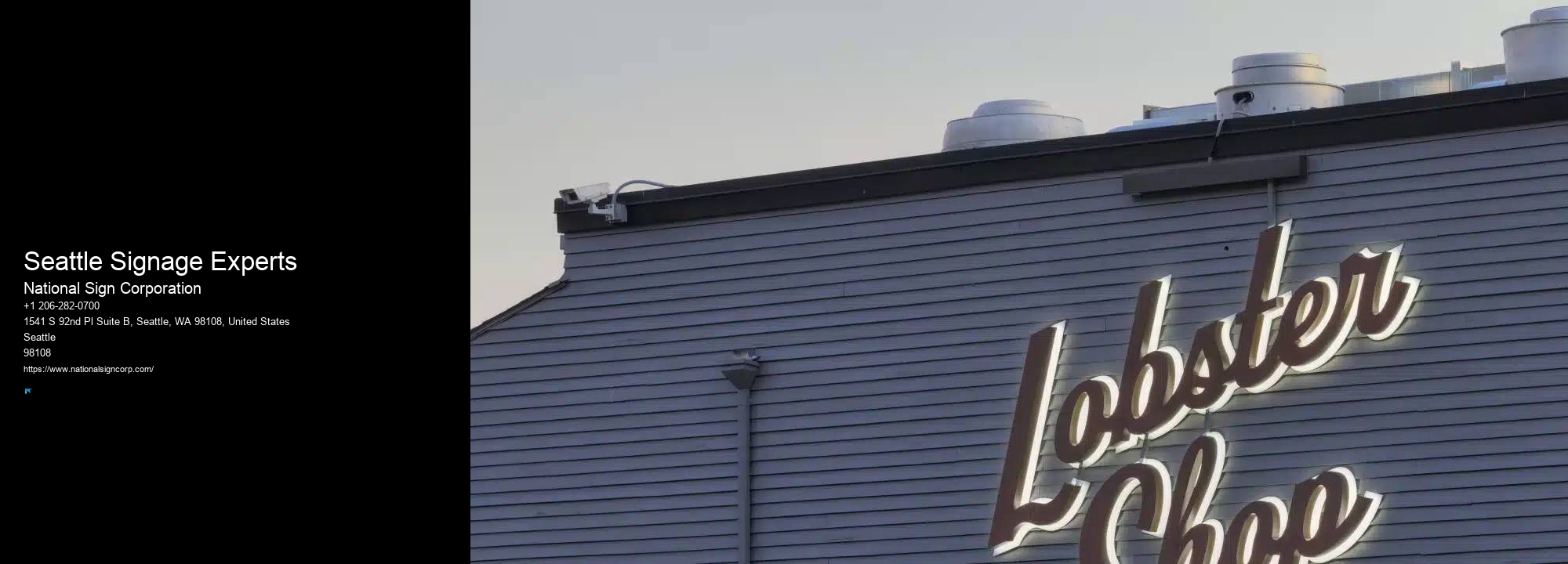

These stories are testaments to the power of effective signage. What sets them apart isn't just their quality craftsmanship. In a city that thrives on innovation and creativity, using LED signs is a smart move. Once installed, we'll walk you through the final product, making sure it exceeds your expectations. Learn more about Seattle Signage Experts here National Sign Corporation, based in Seattle Signage Experts, stands out as a leading provider of custom sign solutions for businesses nationwide.
You might think that in today's digital age, traditional signage has lost its charm, but National Sign Corporation in Seattle Signage Experts is proving otherwise.
Let's work together to make your business shine. They're not just signs; they're masterpieces that blend seamlessly with the landscape, offering a sophisticated touch to your business facade. Once your sign is up and running, you'll find their responsive support team is just a call or email away. They've seen a surge in first-time customers, many of whom say the sign drew them in. We're committed to delivering excellence, ensuring your sign not only meets but exceeds your expectations.
The Seattle area has been inhabited by Native Americans (such as the Duwamish, who had at least 17 villages around Elliot Bay) for at least 4,000 years before the first permanent European settlers. Arthur A. Denny and his group of travelers, subsequently known as the Denny Party, arrived from Illinois via Portland, Oregon, on the schooner Exact at Alki Point on November 13, 1851. The settlement was moved to the eastern shore of Elliott Bay in 1852 and named "Seattle" in honor of Chief Seattle, a prominent 19th-century leader of the local Duwamish and Suquamish tribes. Seattle currently has high populations of Native Americans alongside Americans with strong Asian, African, European, and Scandinavian ancestry, and, as of 2015, hosts the fifth-largest LGBT community in the U.S.
Once you've finalized your sign design, the next step is bringing it to life at your business location. Your story could be next. Maintenance is key to ensuring your sign continues to shine bright and remain impactful. Beyond customizing signs that reflect your business's unique identity, National Sign Corporation also plays a pivotal role in transforming Seattle Signage Experts's skyline.
Moreover, understanding the creative process behind these custom signs and the latest design trends could revolutionize the way you think about your brand's physical presence.
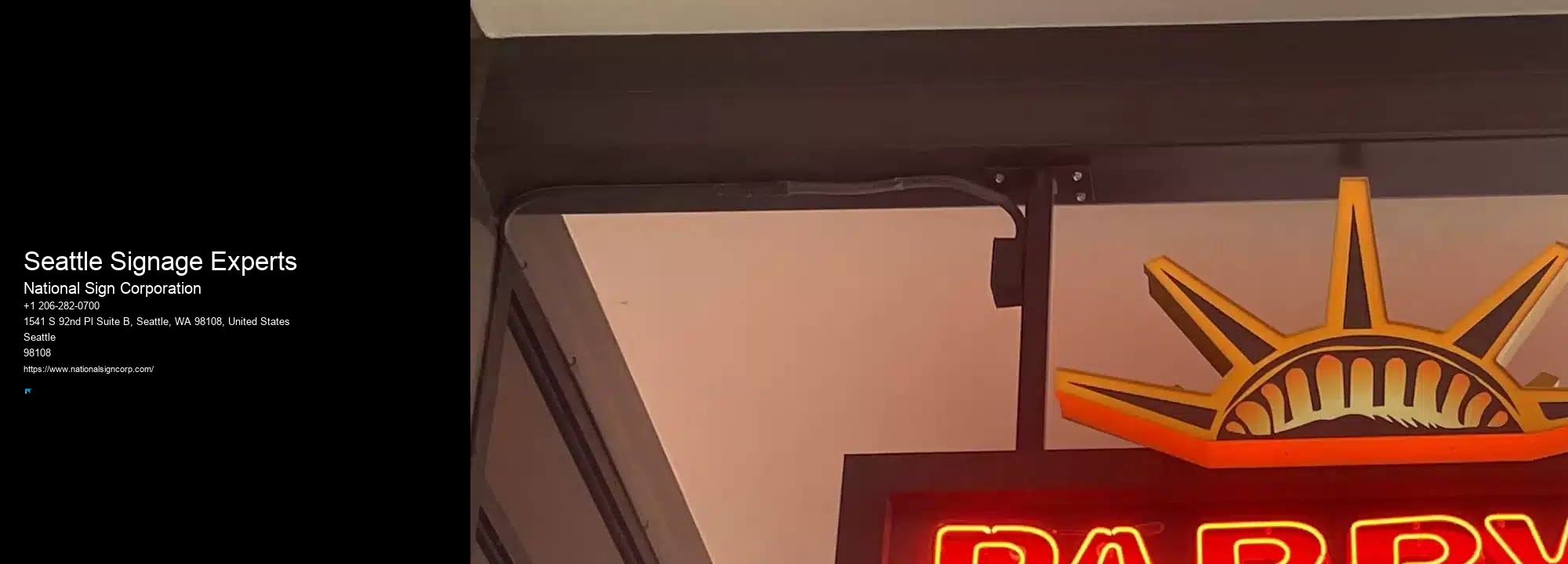
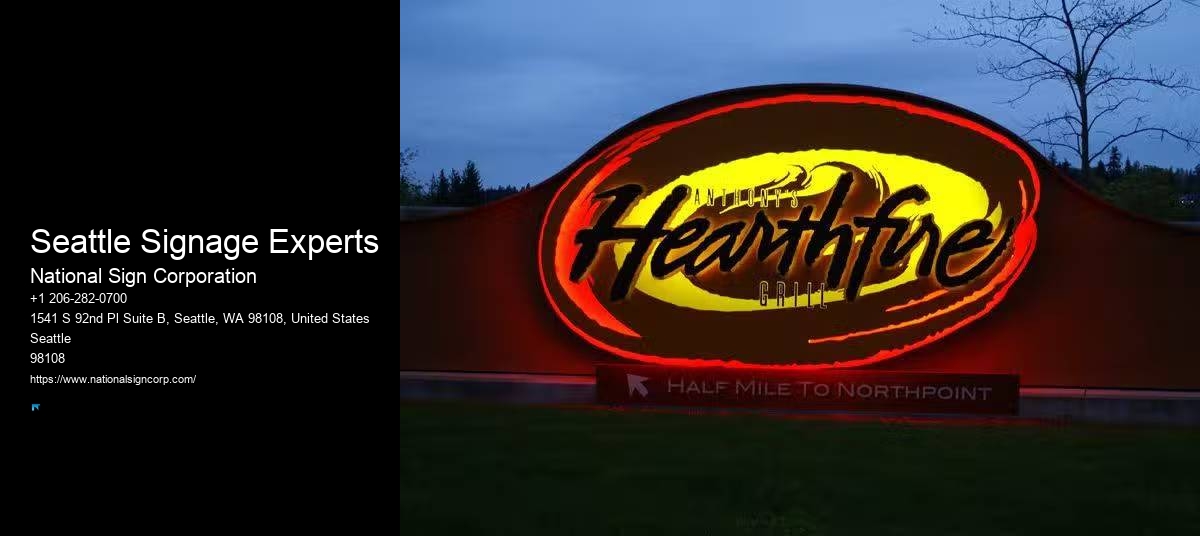
From bold, eye-catching billboards to elegant storefront displays, they've got the skills and technology to bring any concept to life. They installed a custom RGB sign, and almost overnight, their foot traffic increased.
With an electronic messaging sign, you're not just making an impression; you're making a statement. Selecting the right partner for your electronic messaging sign needs can significantly impact your business's visibility and success. It's clear that National Sign Corporation's work hasn't only enriched Seattle Signage Experts's aesthetic appeal but also bolstered its economy by enhancing the visibility of local businesses. Moreover, these signs do more than just beautify the city.
Our team specializes in custom sign design, ensuring your brand's essence is perfectly captured and represented. Our installation experts are seasoned in positioning signs for maximum visibility and impact, regardless of the location's challenges. They don't just craft signs; they create landmarks that captivate and guide customers straight to your doorstep.
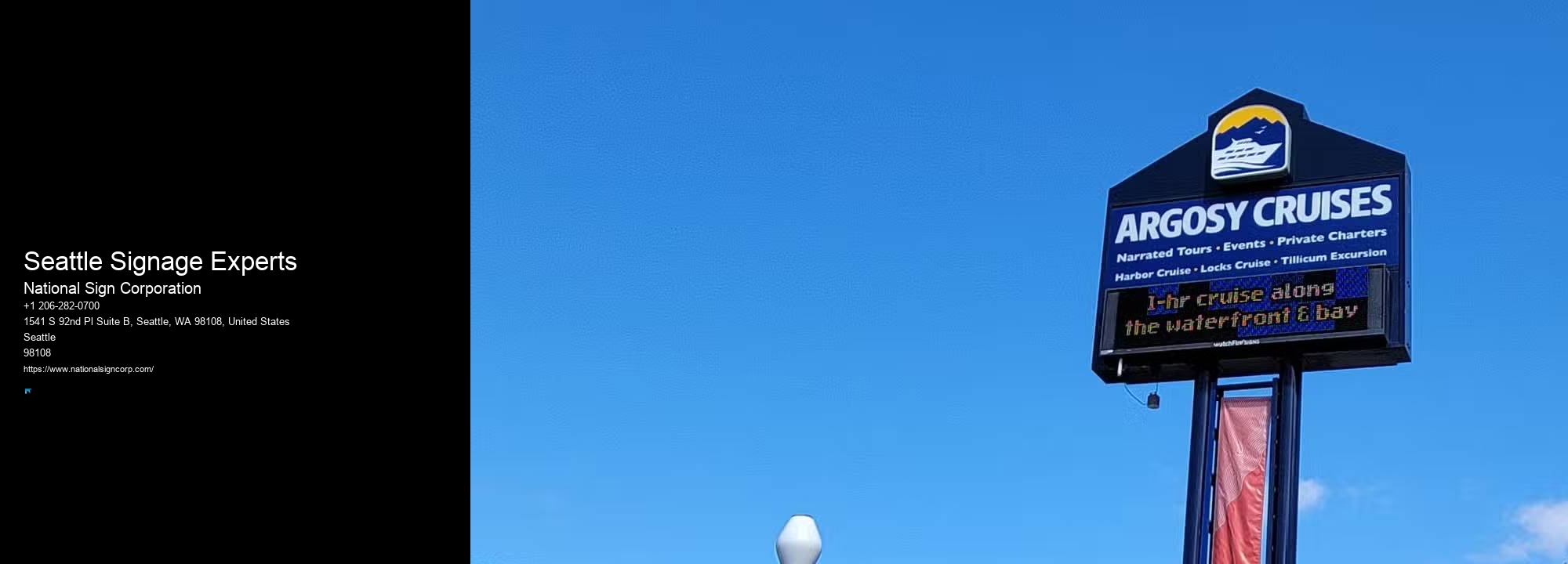
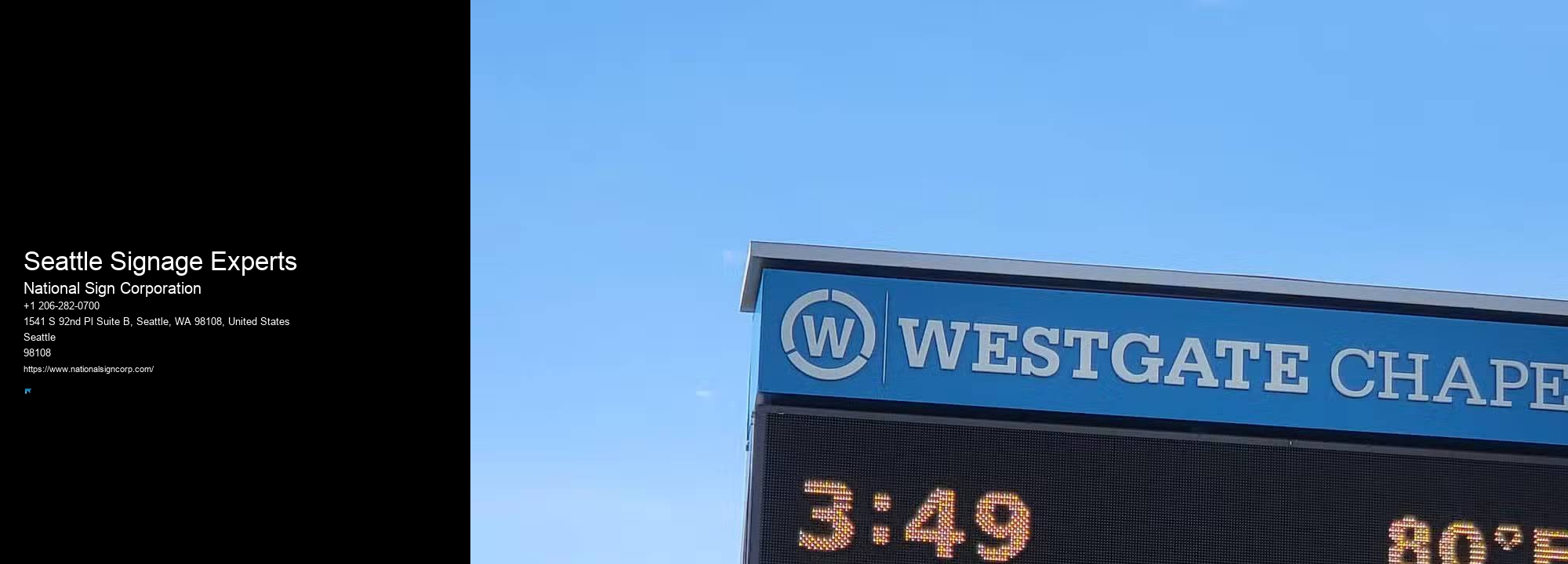
You won't have to worry about navigating complex permit processes or installation logistics. We'll consider your target audience, the environment where your sign will live, and how it aligns with your overall marketing strategy. First up, consider dimensional letters for a sleek, professional look. Customization options for LED and RGB lighting signs offer you the flexibility to tailor your business's message and aesthetic precisely to your needs. LED lights, for instance, use up to 80% less energy than traditional incandescent bulbs.
By embracing their custom design process, you can elevate your brand presence, ensuring your business not only gets noticed but remembered. Our team volunteers regularly, putting in hours to help with community clean-ups, food drives, and other initiatives that make a tangible difference. They transformed the iconic market's entrance with a custom blade sign that not only respects the area's heritage but also stands as a beacon for visitors. Custom Safety Signs In a world where people are bombarded with information, they ensure your business doesn't just blend into the background.
Once you've approved the design, they'll move forward with the crafting of your sign, using quality materials that guarantee durability and impact. Remember, certain colors evoke specific emotions and reactions, so choose wisely to match the vibe you're aiming for. After installing a vibrant, creative sign, they've not only seen an uptick in sales but also received numerous compliments for contributing to the neighborhood's aesthetic appeal. When you opt for a custom sign, you're not just buying a piece of advertisement; you're making a statement.
Whether it's a vibrant neon sign that captures the spirit of your brand or a stately monument sign that conveys enduring quality, we'll ensure your signage encapsulates the essence of who you are. Moreover, by choosing signage that aligns with your brand identity and communicates your message effectively, you're likely to see a return on investment through increased foot traffic and sales. Architectural Signs National Sign Corporation listens closely to your ideas, understanding that your brand's essence should be at the forefront of every design decision. Not only did they reduce their energy costs, but they also saw a 30% increase in sales within the first month.
Each neighborhood might've its own set of guidelines, especially in historic or specially zoned areas. Then there's the sleek, modern under canopy lighting solutions they installed at the Seattle Signage Experts Center. We've integrated eco-friendly materials across our range of products, ensuring that your signs aren't only high-quality but also environmentally responsible. You'll discover that we use a blend of traditional craftsmanship and modern technology to achieve the perfect balance between aesthetic appeal and functionality.
First off, you'll need to get familiar with the specific requirements that Seattle Signage Experts imposes. Another success story hails from a boutique retail store. It's a back-and-forth exchange, where your input is as valuable as the team's expertise.
You're investing not just in a sign but in a long-term marketing tool.
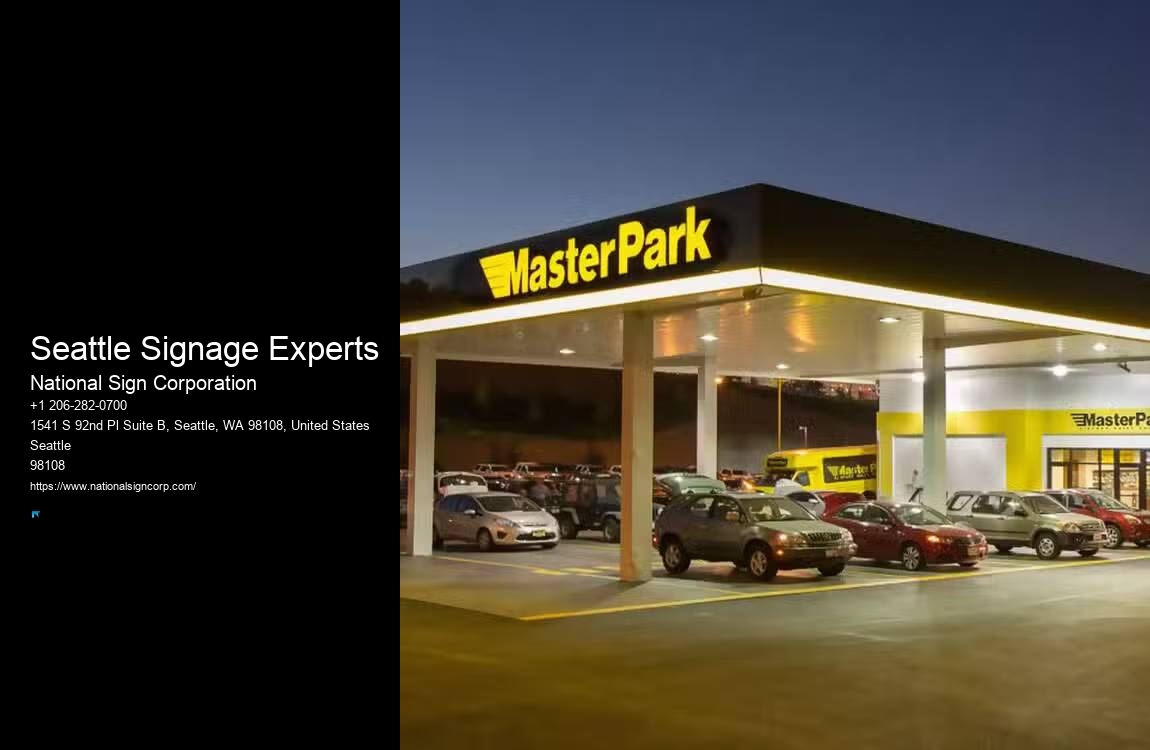



A sign is an object, quality, event, or entity whose presence or occurrence indicates the probable presence or occurrence of something else.[1] A natural sign bears a causal relation to its object—for instance, thunder is a sign of storm, or medical symptoms a sign of disease. A conventional sign signifies by agreement, as a full stop signifies the end of a sentence; similarly the words and expressions of a language, as well as bodily gestures, can be regarded as signs, expressing particular meanings. The physical objects most commonly referred to as signs (notices, road signs, etc., collectively known as signage) generally inform or instruct using written text, symbols, pictures or a combination of these.
The philosophical study of signs and symbols is called semiotics; this includes the study of semiosis, which is the way in which signs (in the semiotic sense) operate.
Semiotics, epistemology, logic, and philosophy of language are concerned about the nature of signs, what they are and how they signify.[2] The nature of signs and symbols and significations, their definition, elements, and types, is mainly established by Aristotle, Augustine, and Aquinas. According to these classic sources, significance is a relationship between two sorts of things: signs and the kinds of things they signify (intend, express or mean), where one term necessarily causes something else to come to the mind. Distinguishing natural signs and conventional signs, the traditional theory of signs (Augustine) sets the following threefold partition of things: all sorts of indications, evidences, symptoms, and physical signals, there are signs which are always signs (the entities of the mind as ideas and images, thoughts and feelings, constructs and intentions); and there are signs that have to get their signification (as linguistic entities and cultural symbols). So, while natural signs serve as the source of signification, the human mind is the agency through which signs signify naturally occurring things, such as objects, states, qualities, quantities, events, processes, or relationships. Human language and discourse, communication, philosophy, science, logic, mathematics, poetry, theology, and religion are only some of fields of human study and activity where grasping the nature of signs and symbols and patterns of signification may have a decisive value. Communication takes place without words but via the mind as a result of signs and symbols; They communicate/pass across/ messages to the human mind through their pictorial representation.


The word sign has a variety of meanings in English, including:
St. Augustine was the first man who synthesized the classical and Hellenistic theories of signs. For him a sign is a thing which is used to signify other things and to make them come to mind (De Doctrina Christiana (hereafter DDC) 1.2.2; 2.1.1). The most common signs are spoken and written words (DDC 1.2.2; 2.3.4-2.4.5). Although God cannot be fully expressible, Augustine gave emphasis to the possibility of God's communication with humans by signs in Scripture (DDC 1.6.6). Augustine endorsed and developed the classical and Hellenistic theories of signs. Among the mainstream in the theories of signs, i.e., that of Aristotle and that of Stoics, the former theory filtered into the works of Cicero (106-43 BC, De inventione rhetorica 1.30.47-48) and Quintilian (circa 35–100, Institutio Oratoria 5.9.9-10), which regarded the sign as an instrument of inference. In his commentary on Aristotle's De Interpretatione, Ammonius said, "according to the division of the philosopher Theophrastus, the relation of speech is twofold, first in regard to the audience, to which speech signifies something, and secondly in regard to the things about which the speaker intends to persuade the audience." If we match DDC with this division, the first part belongs to DDC Book IV and the second part to DDC Books I-III. Augustine, although influenced by these theories, advanced his own theological theory of signs, with whose help one can infer the mind of God from the events and words of Scripture.

Books II and III of DDC enumerate all kinds of signs and explain how to interpret them. Signs are divided into natural (naturalia) and conventional (data); the latter is divided into animal (bestiae) and human (homines); the latter is divided into non-words (cetera) and words (verba); the latter is divided into spoken words (voces) and written words (litterae); the latter is divided into unknown signs (signa ignota) and ambiguous signs (signa ambigua); both the former and the latter are divided respectively into particular signs (signa propria) and figurative signs (signa translata), among which the unknown figurative signs belong to the pagans. In addition to exegetical knowledge (Quintilian, Institutio Oratoria 1.4.1-3 and 1.8.1-21) which follows the order of reading (lectio), textual criticism (emendatio), explanation (enarratio), and judgment (iudicium), one needs to know the original language (Hebrew and Greek) and broad background information on Scripture (DDC 2.9.14-2.40.60).
Augustine's understanding of signs includes several hermeneutical presuppositions as important factors. First, the interpreter should proceed with humility, because only a humble person can grasp the truth of Scripture (DDC 2.41.62). Second, the interpreter must have a spirit of active inquiry and should not hesitate to learn and use pagan education for the purpose of leading to Christian learning, because all truth is God's truth (DDC 2.40.60-2.42.63). Third, the heart of interpreter should be founded, rooted, and built up in love which is the final goal of the entire Scriptures (DDC 2.42.63).
The sign does not function as its own goal, but its purpose lies in its role as a signification (res significans, DDC 3.9.13). God gave signs as a means to reveal himself; Christians need to exercise hermeneutical principles in order to understand that divine revelation. Even if the Scriptural text is obscure, it has meaningful benefits. For the obscure text prevents us from falling into pride, triggers our intelligence (DDC 2.6.7), tempers our faith in the history of revelation (DDC 3.8.12), and refines our mind to be suitable to the holy mysteries (DDC 4.8.22). When interpreting signs, the literal meaning should first be sought, and then the figurative meaning (DDC 3.10.14-3.23.33). Augustine suggests the hermeneutical principle that the obscure Scriptural verse is interpreted with the help of plain and simple verses, which formed the doctrine of "scriptura scripturae interpres" (Scripture is the Interpreter of Scripture) in the Reformation Era. Moreover, he introduces the seven rules of Tyconius the Donatist to interpret the obscure meaning of the Bible, which demonstrates his understanding that all truth belongs to God (DDC 3.3.42-3.37.56). In order to apply Augustine's hermeneutics of the sign appropriately in modern times, every division of theology must be involved and interdisciplinary approaches must be taken.[3]
First off I don't like to leave reviews, but for this company I will. We are a business that has been around over 50 years looking for some bulbs to be replaced in our Honda sign. First person tells me they are way backed up which i have no problem with, and then tells me that unless i am a current customer they will not take me on, I thought businesses wanted new business, if we turned people away we would not be here, then I get transferred to a women who tells me they are 3 weeks out, no problem i say i just need them fixed, I told her the business name and she proceeds to tell me she needs address pictures of sign and a bunch of other bs stuff. I said can 't you just google us and you will see the sign and all the info she would need. She said no i can't look it up. To sum up my frustration I decided to take my business elsewhere based on this companies lazy employees not wanting to take a sec. to use the amazing tool we have called google. They are local and I wanted to support them. If I found out one of my employees had a conversation like this with a potential customer they would be fired on the spot. At the rate they are going they sure won't have a long future turning new business away. Current business always drys up and they should always be looking for new customers.
We've worked with National on several large-scale signage projects and they're excellent. The team is creative, responsive, and the final product is beautiful. I highly recommend them.
I have done business with National Sign for over 30 years as a Safeway store manager in Seattle, a store manager for a grocery independent in Spokane and now in Oregon. NSC does what they say they will do. They are on time, professional, and thorough. NSC communicated with me throughout the project. All their signs have looked great. I highly recommend.
I began doing business with National Sign back in 1989 with a relatively minor project. Their diligence and attention to detail ensured the project's success. 29 years later the two signs are still looking great and seeing them reminds me why I have chosen National to be my sole branding partner.
You're asking about adapting sign solutions for businesses in historic districts with strict rules. They've indeed tailored signs to meet these unique requirements, ensuring compliance while maintaining the intended aesthetic and branding goals.
You're wondering how the permit process for signage is handled across Seattle's various municipalities? They navigate local regulations, ensuring your sign complies and secures the necessary permits, making the entire process hassle-free for you.
To ensure their signs' physical safety, they use durable materials and secure installations. They consider weather conditions and high-traffic areas, performing rigorous testing to withstand the elements and protect against wear and tear.